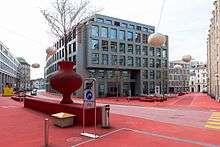Raiffeisen (Switzerland)
Raiffeisen Switzerland is a union of all the Swiss Raiffeisen banks. It bears responsibility for the business policy and strategy within the Raiffeisen Group. The 246 independent Raiffeisen banks are organised on the basis of a cooperative. With 896 branches in total, they make up the densest branch network in Switzerland. In the 21st century, the Raiffeisen Group has become the third-largest banking group in Switzerland with total assets currently at CHF 229 billion. It is one of the country's leading retail banks. Since June 2014, Raiffeisen has been classified as one of Switzerland's systemically important banks and must therefore meet special requirements in terms of capital. Raiffeisen Switzerland has 3.8 million clients in Switzerland, of whom 1.9 million are cooperative members and thus co-owners of their regional Raiffeisen banks.
| Cooperative Public company | |
| Founded | 1899 |
| Headquarters | , Switzerland |
Number of locations | 880 locations |
Key people | Heinz Huber (CEO), Guy Lachappelle (BoD Chairman) |
| Total assets | ≈ 225 Mrd. CHF |
Number of employees | 9,215 (full-time positions) |
| Website | raiffeisen |
Union organisation

The 246 legally independent Raiffeisen banks in Switzerland joined together to form Raiffeisen Switzerland (formerly called the Swiss Union of Raiffeisen Banks). Like the participating Raiffeisen banks, Raiffeisen Switzerland is a cooperative. It coordinates the Group's activities, creates the basic conditions for the business activity of the local Raiffeisen banks (such as IT, infrastructure and refinancing), and advises and supports them in all commercial matters. Furthermore, risk management and auditing also come under the remit of Raiffeisen Switzerland. Raiffeisen Switzerland runs directly managed branches in the urban regions of Basel, Bern, St. Gallen, Thalwil, Winterthur and Zurich, whereby these are not independent cooperatives. Raiffeisen Switzerland's headquarters have been unofficially located in St. Gallen since 1912 and were made the legal headquarters in 1936.
History
The ideas of Hermann Schulze-Delitzsch and Friedrich Wilhelm Raiffeisen, particularly those regarding the principle of self-help, met with great interest in Europe. They caught on in rural areas in particular. The first Raiffeisen bank in Switzerland was founded on the initiative of parish priest Johann Traber in 1899 in Bichelsee. In 1902, ten institutions founded the Swiss Raiffeisen union. From 1912 onwards, the union ran a collective office in St. Gallen, and this was expanded over the following 40 years by its director Josef Stadelmann. In 2017, the Swiss Financial Market Supervisory Authority (FINMA) launched enforcement proceedings against the banking group[1] in relation to corporate governance issues, and against the former Chairman of the Executive Board, Pierin Vincenz, for his handling of conflicts of interest while in office. Due to Vincenz's resignation as Chairman of Helvetia Insurance and his pledge that he would no longer seek any positions of responsibility with banks or insurance companies, FINMA terminated the proceedings against Vincenz, while those against Raiffeisen Switzerland remained ongoing. After an eight-month investigation, FINMA concluded its enforcement proceedings against Raiffeisen in June 2018.
Commercial principles
In areas of operation that are geographically clearly defined, the Raiffeisen cooperative banks provide services to the people of the relevant region. By keeping customer deposits within their area of operation, they aim to contribute directly to the development of the region. Furthermore, Raiffeisen banks also support local associations and social institutions. They provide employment to area residents and contribute taxes to the local authorities.
The principles on which they are based include local roots and proximity to clients, as well as the cooperative structure and the combination of cooperative values with commercial thinking. Management responsibility at Raiffeisen is distributed in a federalist style. Raiffeisen does not pursue growth at any cost. Moreover, its principles include a prudent credit policy and monitoring of risks.
Participations
Raiffeisen Switzerland cooperates with multiple firms to offer their services to the associated Raiffeisen banks. Raiffeisen Switzerland has direct participations in the following enterprises:
- Aduno Gruppe, 25,5 %
- Viseca (Bankkarten)
- Cashgate (Kleinkredite)
- Leonteq, Fintech-Unternehmen, 29 %[2]
- Raiffeisen Unternehmerzentrum AG, 100 % (since 2014)
- SIX Group (Schweizer Börse), 3,2 %
- Swiss Bankers Prepaid Services (Reisezahlungsmittel), 16,5 %
- Responsability (Mikrofinanz in Entwicklungsländern), 15 %
- KMU Capital AG (Mezzanine-Finanzierung)[3]
- Twint (Mobile-Payment), 5 %[4]
Following the departure of Vincenz, a critical appraisal of these participations was undertaken and, since then, a reduction of participations has been underway.[17] Thus Notenstein Private Bank (private bank, online private bank), which had been 100% owned by the Group since 2012 and had been expanded through the takeover of the adjusted client base and the employees of La Roche private bank in 2015 [18], was sold to Vontobel private bank in May 2018 for CHF 700 million.
Literature
- Sibylle Obrecht: Raiffeisen. Verlag Huber, Frauenfeld 2000, ISBN 3-7193-1185-6
- Andreas Zakostelsky, Friedrich Hagspiel (Hrsg.): Weißbuch Verbund. Überblick der Verbundstrukturen bei europäischen Genossenschaftsbanken. Wien 1999
Links
- Raiffeisen Schweiz
- Sibylle Obrecht: Archived [Date missing] at raiffeisen.ch [Error: unknown archive URL] In: Panorama Raiffeisen 3/2000 (PDF; 263 kB)
References
- Swissinfo: Financial watchdog accuses Raiffeisen of major governance failings, checked on 19.11.2019
- Marc Badertscher: Liaison dangereuse. In. Handelszeitung, 23. März 2017, S. 3
- Zahlen und Fakten, abgerufen am 31. Oktober 2017
- Raiffeisen Gruppe: Geschäftsbericht 2017, abgerufen am 12. Dezember 2018 (PDF).